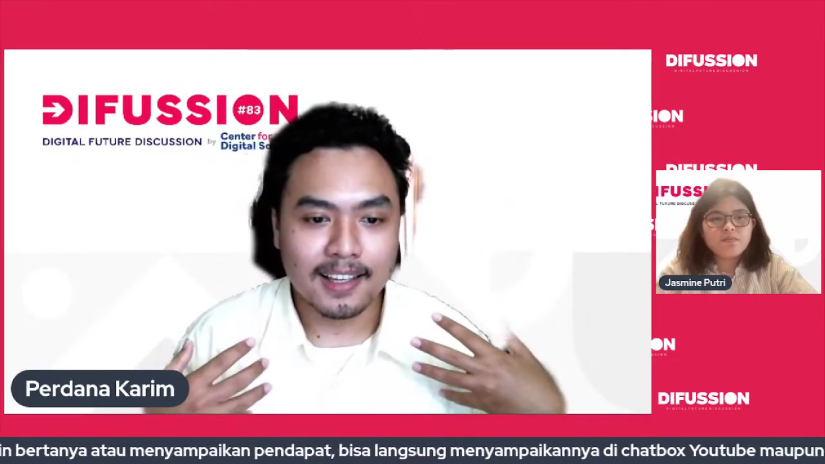
Yogyakarta, January 24th 2022─Issues related to Artificial Intelligence (AI) are increasingly prevalent in society. These various artificial intelligences are now being used because they are considered more effective and practical, and allow anyone to produce work easily. In response to this discourse, the Center for Digital Society (CfDS) of FISIPOL UGM held Difussion #83 discussion series entitled “Legality in the Digital Era: The Revealance of IP on Regulating AI-Generated Arts” on Tuesday (24/1).
The talk show, which was held online via YouTube channel and Zoom Meeting, invited two active practitioners in the fields of Intellectual Property (IP) and AI. One of them is Bhredipta Socarana as an Intellectual Property Practitioner. “Intellectual Property (IP) is intangible material rights, the duration of which is also protected in various periods. Transferable, and licensed, the protection is territorial and applies after the IP is registered, except for copyright. Indonesian law itself also regulates intellectual property protection and copyright strictly,” explained Bhredipta. He explained how the protection of copyright provides limitations on which intellectual property needs to be protected, along with the violations.
“Then what about AI? If AI takes the data of protected people and gets copyright protection, and it doesn’t ask permission for that use, then copyright infringement can occur,” said Bhredipta. He added that accountability regarding copyright infringement by AI could be imposed on many parties, especially the user or users of AI itself.
CfDS practitioner, Perdana Karim, who likes to work on AI issues in art, also agrees with the issue of copyright in AI. “This artist who uses AI basically uses an algorithm that can produce visual output. AI, such as generative arts, emerges based on accumulations of works that have appeared on the internet, works whose status is unclear. Is it a public domain work or has a copyright,” said Karim.
Karim added, the existence of AI is basically a tool to facilitate all human activities, not as a replacement or “the substitute for humans”. It did not stop there, Karim also explained his views regarding the expected development of AI in the future.
“The existence of AI does not mean that the existence of old artists will be shifted, it will even be needed even more. The way AI works itself also still requires operations from humans. We are quite sure that AI is a form of “tool” and not purely a creator of works like humans. It is hoped that this belief can create harmonization between humans and machines,” said Karim.
